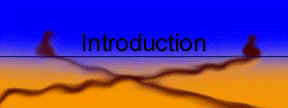|
The Station of the Undefendable |
||
|
|
“I am no one in existence but myself, so—
Whom do I treat as foe and whom do I treat as friend?
Whom do I call to aid my heart, pierced by a penetrating arrow,
When the one who shot the arrow is my eyelid, striking my heart without an archer?
Why defend my station? It matters little to me, what do I care?
For I am in love with none other than myself, and my very separation is my union.”
From “Epistle on Cosmic Unification” By Muhyiddin Ibn ‘Arabi
Translated from the Arabic by Angela Jaffray
It seems to me that the main reason, if not the only one, for living is
to prepare a strategy for leaving, for to live is to leave something behind.
Life has ups and downs but by the end it boils down to having a departure
plan. Your legacy, your children as well as your belongings may survive you,
but nothing that identifies itself as you, for it has always been a secret
very well kept indeed, that death is unfortunately the end.
The path of the Sufi briefly crosses the path of the ordinary person
around the time of that ending, but then they part away from each other.
They will never join hands, for what the Sufi knows all along is that he was
born with the seeds of his death. He nurtures his end from birth and raises
his death like one raises a child. He doesn’t accrue death like a vacation;
death is the purpose and the main reason to be alive.
Legends abound with stories of Sufis trying to show a novice or a
knowledge seeker a path that usually includes facing pain, climbing mountains and crossing rivers. Sufis and sages often conclude these legends by telling the seeker that he has earned himself by learning to overcome his inner hurdles. The Sufi never delivers a truth at the end nor promises one. What you uncover is what you’ve always had. Yet what was there to begin with? Knowledge is not something you acquire at the end of a journey. It is to fathom what you knew all along about your own end.
The Sufi has no answer and it’s even foolish to expect from him a
question; he can only paraphrase himself. Alas, even knowledge if meant
in the sense of acquiring external information will lead you astray. The
knowledge that Sufis promote is not increased through learning, does
not improve over time, and does not fail you even when you forget it. The
Sufi knows that the seed is in him and that he has to teach others as well
as himself the impossibility of knowing. The one you reach by the end of
your journey is always yourself for you were and are always the object of
the search.
The Sufi’s knowledge -- and that is how I speak of his refusal to
acquire external information -- is the power that sustained Sisyphus
when rolling the rock. The journey that takes you out will never get you
anywhere. All journeys are internal; otherwise they lead to acquisition
but not to enlightenment.
To not have doesn’t mean poverty, to not be arrogant doesn’t mean
modesty, to not acquire doesn’t mean ignorance. Knowledge parallels
learning and Sufism abhors acquisition. I can read but not write my destiny, for
writing is not for knowledge seekers. How can you write after all, when
you are a letter rather than a pen? To read is to be read. I open myself
to myself to read myself. I know already what to expect and I need only to
decipher my own language.
Knowledge is a quagmire. By how much do I increase my knowledge
when I open a book and read? What knowledge do scrolls hold that I don’t know
already? A good book, the good one as a matter of fact is the one that
can read me and never the one that I can read. Where then do I find such a
book? Nowhere and everywhere, for I am everywhere in every sign and around
every corner.
What the Sufi finds in books that we common people can see is
himself. It is that point in time and space when you can unfurl a scroll and
read your eyebrows and spell your own moves and decipher each and every of
your own features that your eyes have engraved in the characters spread
across the page you read. A Sufi, a sage, a cabal or a Gnostic all read from
the same book because they are all looking for the same person. They think
they see God and we think they see the eternal spirit behind life while the
truth is simpler than god and eternity. Sufis are the glorious epic of humans
winning over their humanity.
To all seekers of truth, let it be known that there is no god but
the reader.
© Karim Chaibi 2006
|
